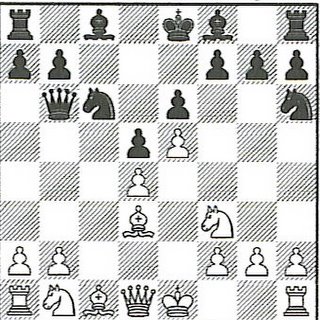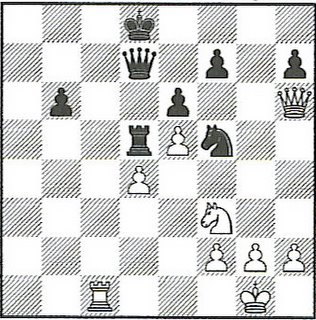NN (1553) - CelticDeath(1568) [B01]
2006 Twin City Championship Normal, IL (4), 28.02.2006
B01: Scandinavian Defence
1.e4 d5 2.exd5 Nf6 3.Bb5+
My opp has successfully played this variation against me before in a tournament game. However, I have since learned how to properly play against it!
3...Bd7 4.Bc4 Bg4 5.f3 Bf5 6.Nc3 Nbd7 7.Nge2 Nb6 8.Bb5+ Bd7 9.Bxd7+ Qxd7 10.d4 Nbxd5 11.Nxd5 Qxd5 12.0–0 0–0–0 13.Bf4 e6 14.b3 Bd6 15.c4 Qf5 16.Be3
There is a general principle that I have recently discovered that addresses a move like this. It states that you should never avoid an exchange of minor pieces if moving the minor pieces makes it inferior. My opp has certainly reduced the power of his bishop here. 16...Rhe8 17.c5 A small blunder.
17...Bxc5 18.Ng3 Qg6 19.Rc1 Bd6 20.Bf2 h5 Although this pawn advance works out for me, I'm still not convinced that it was the correct strategy. Perhaps it was, but perhaps it wasn't.
21.Re1 h4 22.Ne4 Bf4 I move the bishop, because I feel I need to keep it on the board. 23.Rc4 h3 24.g3 A pseudo attack against the bishop. The bishop stays where it is for the rest of the game.
24...Nd5 25.Kh1 f5 26.Nc3 Nxc3 27.Rxc3 e5 28.d5 e4 29.fxe4 fxe4 30.Bxa7 e3 I really wanted this clearance move to work, and it does. However, Fritz has shown me that White has a save in
31. Qf3 31.Bxe3 Qe4+ 0–1
 1. e4 d5 2. exd5 Nf6 3. Bb5+ Bd7 4. Bc4 Bg4 5. f3
1. e4 d5 2. exd5 Nf6 3. Bb5+ Bd7 4. Bc4 Bg4 5. f3
Bf5 6. Nc3 Nbd7 7. Nge2 Nb6 8. Bb5+ Bd7 9. Bxd7+ Qxd7 10. d4 Nbxd5 11. Nxd5
Qxd5 12. O-O O-O-O 13. Bf4 e6 14. b3 Bd6 15. c4 Qf5 16. Be3 Rhe8 17. c5 Bxc5
18. Ng3 Qg6 19. Rc1 Bd6 20. Bf2 h5 21. Re1 h4 22. Ne4 Bf4 23. Rc4 h3 24. g3 Nd5
25. Kh1 f5 26. Nc3 Nxc3 27. Rxc3 e5 28. d5 e4 29. fxe4 fxe4 30. Bxa7 e3 31.
Bxe3 Qe4+ 0-1




